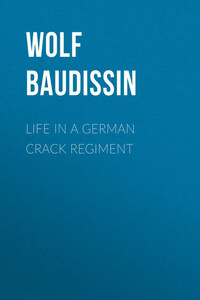Lieutenant Bilse, Beyerlein, and Baron von Schlicht,1 the author of the present work, with their many less-known followers, have managed among them to create what may be regarded as a novel of a new species – the "critical" military novel. What is commonly called the "military novel," has, of course, long been known in Germany, but it differed considerably from the new species. The older military novel gave more or less lively pictures of camp, garrison and casino life, and the gay young lieutenant who generally figured as hero was much adored by ladies (as indeed he still is). But between the lieutenant of romance and the lieutenant of stern reality there is a gulf. Readers have now before them the lieutenant of reality, and the uplifting of the veil on his interesting, if not very edifying, personality and doings, has aroused in Germany a curious storm of indignation, especially in army and official circles. Indeed, as may be remembered, Baron von Schlicht was "insulted" over the present work in the Reichstag itself, and the affair went so far that a duel nearly followed. The widespread interest taken in these revelations of military life is testified by the number of copies of the present work (40,000) which have been sold in Germany, though its circulation is now forbidden there; while for his outspokenness in this novel it is rumoured that Baron von Schlicht has to meet his trial in Berlin very shortly.
Though widely known as the author of various military sketches and stories of a more or less light and humorous turn, in the present case Baron von Schlicht shows little trace of his characteristic vein. Here, rather, he devotes himself seriously to making what is in effect a detailed and apparently dispassionate exposé in regard to the manners and morals of officers of the old nobility in the German army. The indignation aroused against him is all the greater as he himself belongs to the old nobility which he so freely criticises, and he has the further advantage of speaking from inside knowledge of the officers' caste (Offiziers-Kaste) to which he himself belonged during his military career. Lieutenant Bilse wrote from outside this circle of the old nobility; thus Baron von Schlicht's work fills a gap which Lieutenant Bilse's book still left open.
CHAPTER I
By Command of the Emperor
The "Yellow Butterflies," as Franz Ferdinand Leopold's infantry regiment was called on account of its yellow epaulettes, was celebrating its anniversary; the day when, more than forty years ago, it lost in a famous battle a third of its rank and file and more than half of its officers. The memory of the heroic deeds of the regiment could not be allowed to perish; the younger generation were continually reminded of them, and thus the celebration of the anniversary of the famous battle was accompanied by the toast: "In remembrance of the fallen; for the encouragement of the living." The fallen, for what they had done, were given every year a magnificent wreath tied with a gigantic ribbon of the regimental colours; the living, who had as yet done nothing, were given a splendid dinner with equally splendid wine: and when the enthusiasm aroused by the official speech of the colonel, under the influence of the champagne, had done its work, the officers all declared again and again that when the regiment went into battle they would know how to die as bravely as their comrades – and they really meant what they swore.
To-day the anniversary was being celebrated with especial magnificence, for new officers' quarters were to be opened, which were to be used exclusively as a mess-room. Only at mid-day, as he was preparing his oration, did it occur to the colonel that the dedication of this building, which was intended for purely pleasurable purposes, was not altogether in harmony with the solemn anniversary of the dead. He could not very well say, "In order to honour the noble dead we open to-day our new mess-room, which, I hope, will be a financial success." Certainly that would not do. Then a way out of the difficulty occurred to the colonel; he would simply say, "And we vow to the fallen heroes, that within these walls we will above all practise the spirit of comradeship, and the soldierly virtues, which animated them and fitted them to perform their heroic deeds." That would make a suitable impression; and so in a pleasant frame of mind he betook himself to the mess-room where there was much excitement and bustle. In the morning the usual formalities had been followed; almost all the former officers of the regiment had appeared, the closely allied regiments had sent deputations, and nobody had come with empty hands. A veritable shower of silver ornaments had been poured upon the "Golden Butterflies," and now all were thronging into the reception-rooms, greeting mutual friends, admiring the presents, and awaiting the arrival of the important officials.
Dinner was to take place at seven o'clock, and on the stroke of the hour the representative of His Majesty appeared. Originally the Emperor had promised the regiment the honour of his presence, but at the last moment he had been prevented from attending.








